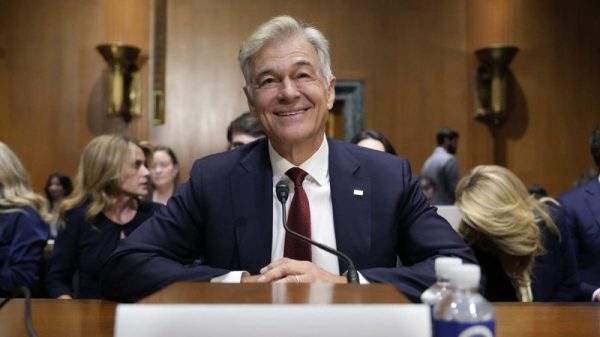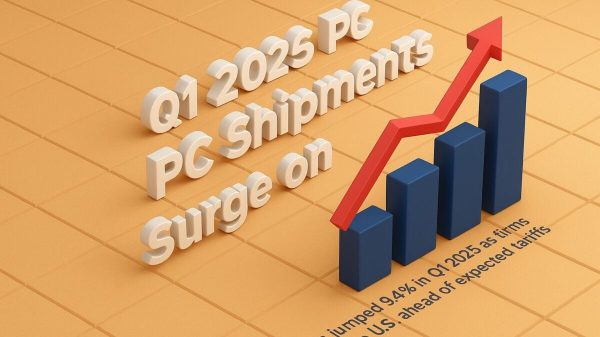Blockbuster job growth continues to power the U.S. economy, with the Bureau of Labor Statistics reporting 303,000 payrolls added in March.
Usually, such strong growth might signal that inflation could pick up. If employers see more demand for goods and services, they need to hire more workers — and if there aren’t enough workers, they have to increase pay, which increases the overall cost of running the business.
But while annual price growth, at more than 3%, remains above the Federal Reserve’s 2% target, it is still well below the 9% peak seen in the summer of 2022.
Economists increasingly believe that the post-pandemic surge in immigration is a key reason the economy has been able to grow steadily without pushing inflation higher, as the new arrivals have helped employers fill roles at levels of pay that have kept a lid on overall price growth.
In a note to clients published Friday, titled “Why we have both strong growth and lower inflation,” Goldman Sachs chief U.S. economist David Mericle said rising immigration had boosted labor force growth. As a result, the strong demand that consumers continue to exhibit elsewhere is unlikely to raise prices by much, “if at all,” he said.
In fact, so far, measures of labor market “tightness,” like wages, “have continued to fall or move sideways, not rise,” Mericle said.
“Won’t stronger growth prevent inflation from falling or even reignite it?” he wrote. “We don’t think so.”
The Congressional Budget Office, a nonpartisan federal agency, was the first to cite the immigration surge that began in 2022 as the primary factor helping to expand the overall size of the U.S. labor force.
This year, the agency increased its projection of how large the U.S. labor force could be in 2033 by 5.2 million people. Most of that increase is expected to be a result of higher projected net immigration.
The Brookings Institution, a nonpartisan think tank, came to a similar conclusion earlier this month, saying the economy can now tolerate a more brisk pace of job growth without adding to cost concerns.
“Faster population and labor force growth has meant that employment could grow more quickly than previously believed without adding to inflationary pressures,” Brookings said.
Wendy Edelberg, a former Federal Reserve economist now serving as director of Brookings’ Hamilton Project, told NBC News the net effect of immigration on inflation is not entirely obvious — but is likely marginal. Indeed, Fed Chair Jay Powell has expressed similar observations, saying the effect of the new wave of arrivals is “broadly neutral.”
What is clear, Edelman said, is that the immigration surge will allow the economy to tolerate higher levels of job growth without overheating.
“Without immigration, if I’d seen an increase of 300,000, I would have been utterly baffled that wages were not higher,” she said, citing the March jobs report released on Friday.
Wage data shows the annual pace of average hourly pay growth has declined to 4.1% in March after hitting a post-pandemic peak of 5.9% in March 2022.
If the supply and demand for labor were truly out of sync, the pace of wage growth would be much higher, likely translating into higher overall inflation.
Instead, thanks to the immigration surge, businesses in the aggregate can tap into the newly growing labor pool to meet continued demand for their goods and services, without having to raise wages significantly to compete for workers.
For many parts of the economy, from federal Social Security payments all the way down to local businesses that may be looking for workers or new customers, immigration is usually a net good, Edelman said.
At the same time, it tends to put a strain on state and local budgets, she said.
Immigration now ranks as the most volatile domestic issue facing President Joe Biden, with Gallup survey respondents ranking it as the country’s “most important problem,” the first time it has held that position since 2019. Republicans have called on Biden to take extreme measures to stem the entry of migrants, while former President Donald Trump has referred to them as “not humans” and “animals.”
Big cities like New York and Chicago, meanwhile, have faced crises stemming in part from political stunts by Texas Gov. Greg Abbott that have involved sending migrants to those cities at a pace they’re not equipped to handle.
But while the focus of the debate has been on undocumented immigration, the majority of immigrants arriving are actually authorized to work in the U.S., Edelberg said.
Plus, they’re more likely to spend a greater share of their labor income.
“So they’re increasing the demand for goods and services, and helping to supply labor,” she said. “So the net effect on inflation is actually small.”


































